|

photo - mw
_______________________
Marianne Moore
An Octopus
of ice. Deceptively reserved and flat,
it lies 'in grandeur and in mass'
beneath a sea of shifting snow-dunes;
dots of cyclamen-red and maroon on its clearly defined
pseudo-podia
made of glass that will bend–a much needed invention–
comprising twenty-eight ice-fields from fifty to five hundred
feet thick,
of unimagined delicacy.
'Picking periwinkles from the cracks'
or killing prey with the concentric crushing rigor of the python,
it hovers forward 'spider fashion
on its arms' misleading like lace;
(....)
'Like happy souls in Hell,' enjoying mental difficulties,
the Greeks
amused themselves with delicate behavior
because it was 'so noble and fair';
not practised in adapting their intelligence
to eagle-traps and snow-shoes,
to alpenstocks and other toys contrived by those
'alive to the advantage of invigorating pleasures.'
Bows, arrows, oars, and paddles, for which trees provide the
wood,
in new countries more eloquent than elsewhere–
augmenting the assertion that, essentially humane,
'the forest affords wood for dwellings and by its beauty
stimulates the moral vigor of its citizens.'
The Greeks liked smoothness, distrusting what was back
of what could not be clearly seen,
resolving with benevolent conclusiveness,
'complexities which still will be complexities
as long as the world lasts';
ascribing what we clumsily call happiness,
to 'an accident or a quality,
a spiritual substance or the soul itself,
an act, a disposition, or a habit,
or a habit infused, to which the soul has been persuaded,
or something distinct from a habit, a power'–
such power as Adam had and we are still devoid of.
'Emotionally sensitive, their hearts were hard';
their wisdom was remote
from that of these odd oracles of cool official sarcasm,
upon this game preserve
where 'guns, nets, seines, traps, and explosives,
hired vehicles, gambling and intoxicants are prohibited;
disobedient persons being summarily removed
and not allowed to return without permission in writing.'
...(more)

Marianne Moore
b. 15 Nov., 1887
Marianne Moore interviewed by Donald Hall
The Art of Poetry No. 4
paris review
The Past is the Present
Marianne Moore
If external action is effete
and rhyme is outmoded,
I shall revert to you,
Habakkuk, as when in a Bible class
the teacher was speaking of unrhymed verse.
He said - and I think I repeat his exact words -
"Hebrew poetry is prose
with a sort of heightened consciousness." Ecstasy affords
the occasion and expediency determines the form.
_______________________
Sonnet 34
Ted Berrigan
b. 15 Nov. 1934
Time flies by like a great whale
And I find my hand grows stale at the throttle
Of my many faceted and fake appearance
Who bucks and spouts by detour under the sheets
Hollow portals of solid appearance
Movies are poems, a holy bible, the great mother to us
People go by in the fragrant day
Accelerate softly my blood
But blood is still blood and tall as a mountain blood
Behind me green rubber grows, feet walk
In wet water, and dusty heads grow wide
Padré, Father, or fat old man, as you will,
I am afraid to succeed, afraid to fail,
Tell me now, again, who I am
Ted Berrigan at PennSound_______________________
The Moment
Leopold Staff
b. Nov. 14, 1878
What matter that it’s passing? That it passes?
Moments exist if only to pass by,
Hardly mine, no longer anyone else’s,
Like cloudy masterpieces in the sky.
Though everything perpetually changes,
And moments are replaced by moments waiting,
Always in lakes among the masterpieces
Either stars or pretty girls are bathing.
after the Polish of Leopold Staff (1878-1957)
translated by Leo Yankevich
first appeared in Iambs & Trochees
via ordinary finds
Leo Yankevich's poems and translations
_______________________
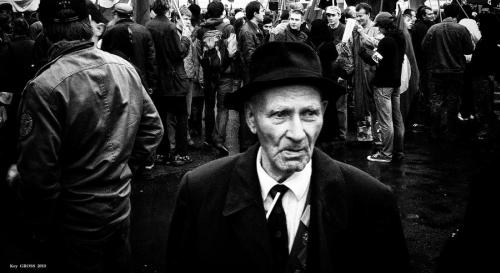
Perplexity
Key Gross (Konstantin Smirnov)
more
_______________________
The Future, or The Society of Looting
Adam Kotsko
An und für sich
The society of looting, the society of go fuck yourself — we live in the society of trying to pretend that we don’t have a society. But we do and we have to — in order to do anything meaningful or worthwhile, we have to join together in pursuit of a common goal. If we all do nothing but try to claim our share, we’ll build nothing and destroy everything. This is not a moral ideal but an objective fact. By building a society on the principle of go fuck yourself, we literally are fucking ourselves, every day, up the ass — no mean feat! It required advanced technology and thousands of years of cultural development to get us to the point where we can fuck ourselves so thoroughly, and man, are we ever fucking going at it.
Brad Johnson
For some reason, this post reminds me of the final paragraph of Italo Calvino’s Invisible Cities:
The Inferno of the living is not something that will be; if there is one, it is what is already here, the inferno we live every day, that we form by being together. There are two ways to escape suffering it. The first is easy for many: accept the inferno and become such a part of it that you can no longer see it. The second is risky and demands constant vigilance and apprehension: seek and learn to recognize who and what, in the midst of hell, are not hell, then make them endure, give them space.
_______________________
Revolution Number Ten
Linh Dinh
Dissident Voice
With its well-armed, confused and increasingly angry populace, the United States can quickly become the mother of all difficult neighborhoods, one would think, but so far, all is placid. We rally, rant and hold up cute signs, yes, but unlike the Thais, we don’t occupy the central commercial district for two months, then torch a mega shopping center and the stock exchange. We don’t riot like the French and the Greeks, or topple the government like Icelanders.
The Obama card was a brilliant move by our ruling class. After eight years of Bush, they placated our liberals and blacks with an articulate and personable black effigy. After four years of Obama, they will likely appease the gun happy and ultra religious with a deer hunting mom of a combat soldier. Sarah is so “real,” she even has a reality show. Pacified momentarily by a fake head, many Americans won’t realize, yet again, that nothing has changed. Many will celebrate and weep, and equally earnest lines such as these will be written, “Citizenship is a passionate joy at times, and this is one of those times. You can feel it. Tuesday the world changed. It was a great day.” (Rebecca Solnit in The Nation, 11/6/08.) I have a feeling, however, that we may be nearing the end of being jerked back and forth like this, that even the most insensate and silly among us is about to explode....(more)
_______________________
A Pragmatist's Vocabulary
Levi Asher
(....)
Our Pragmatist's Vocabulary requires a word for a "truth" that is widely revealed as false and yet lives on, a truth that maintains its utility even when everybody acknowledges its lack of connection to reality. Barack Obama seems to be a frequent target for this type of quasi-truth; the popular notion that he refuses to display his birth certificate is another. Because these types of truths are often used as blunt instruments, I think we ought to call them bluths....(more)
Part 2
_______________________

pyramids
Magic Lantern Slides Collection
The Asia Collection
Hamilton Library
University of Hawai'i - Manoa
_______________________
Collapse Vol. III: Unknown Deleuze [+ Speculative Realism]
November 2007
Subtraction and Contraction: Deleuze, Immanence and Matter and Memory
Quentin Meillassoux
Spinoza was the philosopher who knew full well that immanence was only immanent to itself and therefore that it was a plane traversed by movements of the infinite, filled with intensive ordinates. He is therefore the prince of philosophers. Perhaps he is the only philosopher never to have compromised with transcendence and to have hunted it down everywhere.
...
Spinoza is the vertigo of immanence from which so many philosophers try in vain to escape. Will we ever be mature enough for a Spinozist inspiration? It happened once with Bergson: the beginning of Matter and Memory marks out a place that slices through the chaos – both the infinite movement of a substance that continually propagates itself, and the image of thought that everywhere continually spreads a pure conscious- ness in principle (immanence is not immanent ‘to’ conscious- ness but the other way around).
The project of we ‘Deleuzian philologists’, then, is as follows:to extrapolate, on the basis of this fragment of the crown, the meaning that the pre- Socratic Deleuze attached to the notion – crucial for him, mysterious for us – of immanence.
How shall we proceed? .....
(....) In short, we have two deaths, one of which is worse than the other – and this is indeed why to think with Deleuze – really to think – is something as rare as it is difficult: because to think is to become a neighbour to the worst of the two, and to risk the becoming-chaos of life, its infinite becoming-creative. To think is twice victorious to cross the Acheron: it is to visit the dead, or rather death, and above all to succeed in returning; to remain a structured living being, having tested oneself against the nascent destructu- ration of new fluxes; to maintain oneself in the Outside, but to hold oneself close, thus to some degree closed, and thus to discipline into writing a chaotic experience. Or again, to say it even better, no longer with Nerval but with Deleuze: to think is thrice victorious to cross the Acheron. For it is to have the courage to set out once again towards the worst of two deaths, after having escaped at least once before: it is to return to the worst, knowing all the while that it is the – because, after all, how could one do otherwise? _______________________

photo - mw
_______________________
...the theology of hospitality.
The guest event
Susanne Ringell Translated by David McDuff A short story from Vattnen ('Waters', Söderströms, 2010)
Books from Finland
It was a lagoon. The water was not like out at sea, not a turquoise dream with white vacation trimming on the crests of the waves. This water was completely still and strange, brown yet clear, sepia and umber, perhaps cinnamon, possibly cigar with the finest flakes of finest wrapper. Clean. This water of meetings was clear and clean in a non-platonic, remarkably earthbound way.
Sediment and humus, humus floating about in the morning sun.
It felt comforting, as if the water didn’t repel the foreign bodies as a matter of course, didn’t immediately suppress the other particles and sanctimoniously hasten to force anything that wasn’t water, anything that could be interpreted as pollution and encroachment, down to the bottom and let it dissolve and die all by itself. This water sang its earth-brown song of unity without thereby becoming any less water than water-water was.
Helena felt cold.
So far the morning sun was more light than heat, and Helena felt dawn-cold, but her eyes had already added her body to the waiting water, her pupils communicated to her tensed limbs and knotted stomach that this was a permissive water.
And believed it, as one believes a miracle – less out of faith than of hope.
...(more)

photo - mw
_______________________
Bei Dao
Poems
Translated by Eliot Weinberger
almost island
Reading History
hostile dew in an uprising of plum blossoms
guards the darkness etched by the noon sword
a revolution begins the following morning
the bitterness of the widows cuts through the tundra like a pack of wolves
on account of the prophecies the ancestors are moving backward
into that river of the furious debates of faith and desire
that never end, only a hermit swirl
learns another silence of meditation
go up to see the sunset of kingship
when civilization and flute songs float off in an empty valley
the seasons stand up in the ruins
fruits climb over the walls to chase tomorrow
...(more)
via The Page
_______________________
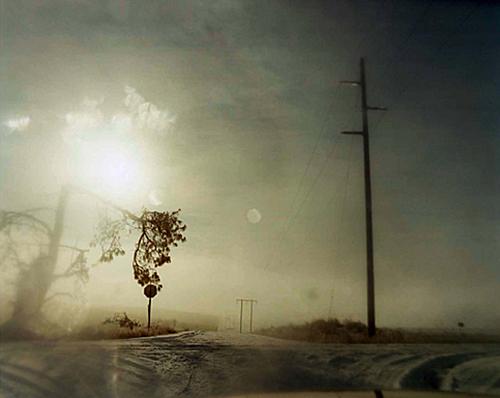
A Road Divided
Todd Hido
Interview with Todd Hido
Ahorn Magazine
_______________________
Poems
Merrill Gilfillan
onedit 6
Covey Call
Wapontake, a word from Magna Carta.
Comanches dreamed a dreamtown
by the river—covey call—complete
with plaza and los ąlamos for shade,
Spanish curtains lifting in the breeze
(optional). And finally got it, about the time
of the Bastille, Santa Feans put it up
to keep the peace a week
or two: Fat diplomats, otońo.
They lived there overwinter,
until the headman’s wife took fever
and died. And that was that,
moved out next day forever.
Now no one can find the place.
Place the find can one no now.
Let’s slip into that field tonight
and see if those 500 melons are ripe.
Merlin burns
a smokering through
the air.
Greasewood
in numbers more lovely
than hair.
...(more)
_______________________
Merrill Gilfillan’s The Bark of the Dog
John Latta
Isola di Rifiuti
The ungainly chop of the “informal continuum.” Olson says: “Flow . . . is not continuous ‘length,’ it is leaped atomism—quanta, jumping like nerves in fatigue— . . . rightly sought & used as a habit.” One with all the amass’d and itch-trigger’d quality of a “physical memory.” Wave / particle: the atomism of flow. The way, scouting through Merrill Gilfillan’s The Bark of the Dog (Flood Editions, 2010), I hit “Damsels”—“demoiselles resting / in an utter stillness / on every other cranny / or twig, every tree / copper-carmine, blanched lapis / tails hiked in the cool air”—and think how it’s a damselfly, wings angled back and clasp’d upright, not the flat-wing’d aeroplane of a dragonfly I’m thinking of (yesterday) saying “green darner.” Thinking’s primary wayward fealty—and excitement—is to its sputtery aggregates of rhythm (see Joyce’s “irregular musketry of applause”) and memory (“jumping like nerves in fatigue”—the two register identically—rounds, bulletins, jump ’n’ jive)....(more)
_______________________
Gary Barwin on Merrill Gilfillan
lemon houn
_______________________
A Nap By The Kickapoo
Merrill Gilfillan
What a face
on that barred owl
dead beside the road --
Rolled it over to see.
Round, jolly, cowled. Lightly
concentrically ringed.
The calm cosmonautical
with the simian fey.
Fox sparrows
sing. "We hated to be apart.
Even for five minutes."
The dreams come down --
Extra! Extra! --
from the cedared hills
across scant pasture
and April brambles
to the leaky
treehouse on the knoll
beyond the stream.
from The Seasons Merrill
_______________________
Fighting the last peace:
Examining our prime minister’s 'Afghaniscam' through the lens of history
David J. Climenhaga
... while there are other, darker reasons for the Canadian role in Afghanistan, the debate is framed in the context of extending freedom, protecting the homeland and eventual total victory because that is the way we have been conditioned to understand war and peace through the lens the last great conflict in which Canada played a significant role -- the Second World War.
What is not so obvious, because of the overwhelming role World Wars I and II played in the creation of Canada's "postwar" self image, is that those great conflicts between industrialized nations in possession of vast technological resources, with populations crowded into great cities and divided by political ideas, and the ultimate dénouement in 1945 in unconditional surrender by our foes and total victory for us, not to mention the prosperous peace that followed, was an exception in history.(....)
... the soaring rhetoric we have read in recent days in the Globe and Mail and other Canadian media about sacrifice, freedom and ultimate victory -- as if Afghanistan were Europe in 1945 -- is largely meaningless and, in the sense that it perpetrates a scam on a people conditioned to think of war in the context of the peace that followed World War II, deeply contemptible....(more)
_______________________
Just the beginning
Lenin's Tomb
Some will inevitably try to paint imaginative, militant action as 'violent'. So let me say this about the 'violence' yesterday. I'm not frightened by the media's hysteria, or browbeaten by the servile centre-left that wants to keep opposition as timid as possible. When people ask why occupy a building, how that helps the cause, the answer is very simple: we want to disrupt the processes of power, and we want them be frightened to do what they're about to do to us. We want them to be afraid of us. They're about to dismantle our social safety net, shred higher education for millions of working class people, cut teaching in schools, raise the cost of living for everyone except the rich, throw hundreds of thousands of people on the dole, creating many more redundancies as a byproduct, and cheating a whole generation of the education and employment that they need for a decent life. That's war, and you can't do that to people and expect them to be polite about it. More occupations, protests, and strikes, would only be the moderate and sensible response to this government's social vandalism....(more)
_______________________

photo - mw
_______________________
Even if we are today seeing recycled ideologies and old religious infirmities being patched up in a hurry and tossed out to feed a general despair, which our ruling wheelers and dealers cash in on, they cannot conceal for long the shift in civilization revealed by May 1968. The break with patriarchal values is final. We are moving toward the end of the exploitation of nature, of work, of trade, of predation, of separation from the self, of sacrifice, of guilt, of the forsaking of happiness, of the fetishizing of money, of power, of hierarchy, of contempt for and fear of women, of the misleading of children, of intellectual dominion, of military and police despotism, of religions, of ideologies, of repression and the deadly resolutions of psychic tensions. This is not a fact I am describing, but an ongoing process that simply requires from us increased vigilance, awareness, and solidarity with life. We have to reground ourselves in order to rebuild—on human foundations—a world that has been ruined by the inhumanity of the cult of the commodity.(....)
The moralization of profit is an illusion and a fraud. There must be a decisive break with an economic system that has consistently spread ruin and destruction while pretending, amidst constant destitution, to deliver a most hypothetical well-being. Human relations must supersede and cancel out commercial relations. Civil disobedience means disregarding the decisions of a government that embezzles from its citizens to support the embezzlements of financial capitalism. (....)
Our internal space-time is maze-like. In it, each of us is at once Theseus, Ariadne, and Minotaur. Our dérives would gain in awareness, alertness, harmony, and happiness if only external space-time could offer meanders that could conjure up the possible courses of our futures, as an analogy or echo of sorts—one that favors games of life, and prevents their inversion into games of death.
Hans Ulrich Obrist In Conversation with Raoul Vaneigem
Translated from the French by Eric Anglčs
e-flux
_______________________
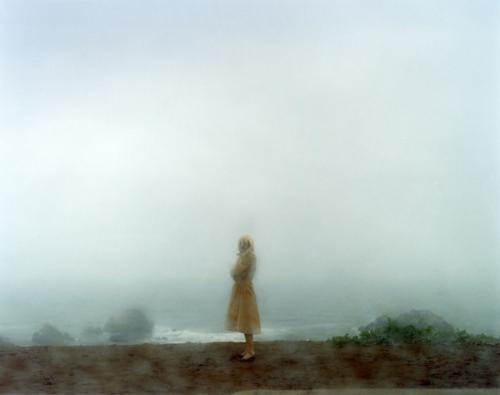
Todd Hido
_______________________
Merrill Gilfillan, from The Seasons
"But this is where I place it, the earliest determination to write poems: a nearly wordless feeling of potential convening, glimpses of the two axials of language interbraiding: the horizontal (the simple recounting, that redemption and testimony within the meditative matrix and course of the mothertongue) and the vertical (the cut of the words in formation above the head where words were not seconds before, the songspur and sonics in the wings of meaning."
via Joshua Corey

Trench With Poppies
1916
official French war photographer
the only color picture known
to show poppies on the battlefield The Heritage of the Great War
_______________________
The Crossing
Andrew Mossin
conjunctions
For Robin Blaser (1925–2009)
Body and soul cast out and cast away
Beyond the visible world.
Yeats, A Vision
1.
The loneliness was verbal, started in the
act of seeing the world before us, finding out what we needed to know.
There is singularity
and there is the enclosed shell of the singular.
A long way from home the shelled pieces
shell-shocked you could say. How can anyone
recall the first experience of
death’s half open doors left
to receive us …
I wandered over to you in the blink
of an eye said there’s something courage
can’t deny ‘the maul the oar and handsaw’
arranged where you left them
a fortnight ago.
‘It is astonishing
how much time has passed—’
How is it we come back here
again and again ageless
aging in place of what once formed
wonder.
Yet the capacity to wander, worldless, without home
except in the language we speak, so that it forms a kind of shell
a loose cavity in which we find ourselves
again and again enduring the weightedness of words, their
stained
improvident elements, word by word, written down on
so many pieces of looseleaf, scratched really, unreadable
at this distance, as if a fold of ash had absorbed
then smudged the writing beyond recognition.
...(more)
_______________________
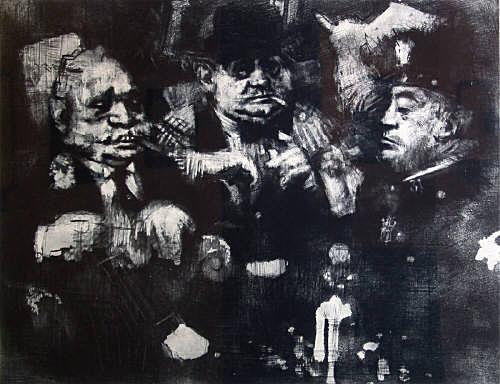
The Feast of Pure Reason
1970
Jack Levine
(January 3, 1915 - November 8, 2010)
_______________________
Race and language after Twain
Joe Palmer
nthposition
"As Christ died to make men holy, let us die to make men rich - our god is marching on."
-
Mark Twain
(....)
A believer is not a bright heathen, a skeptic, a free thinking doubting Thomas, an infidel, cynical doubter, philosopher, atheist, or agnostic. A believer does not know anything for sure, but he has faith in, and hope for, something, and sometimes he has charity, that is, love for others, the willful negation of the selfishness that drives him to become a believer in fairy tales in the first place....(more)
_______________________
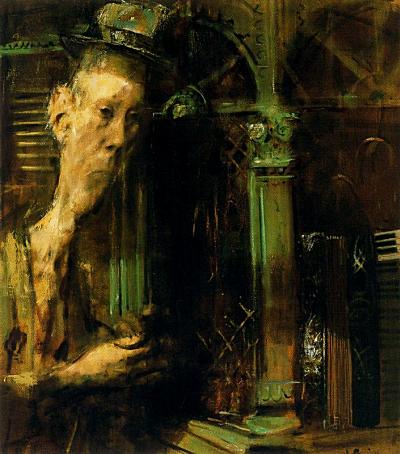
Oak Street
1959
Jack Levine
_______________________
Computers, Cut-ups, and Combinatory Volvelles
Whitney Anne Trettien
electronic book review
[1]
The present determines where, in the object from the past, that object's fore-history and after-history diverge so as to circumscribe its nucleus. // Walter Benjamin
[1.1]
Consider two historical moments - nuclei, in Walter Benjamin's sense of the word - marking both the beginning and the end of the book as a media form.
The first is the publication of Stéphane Mallarmé's poem Un coup de dés Jamais N'Abolira Le Hasard (1897), imagined as a metonym for his multivolume, combinatorial Book, Le Livre. A radical experiment in design and typography, Un coup de dés privileges form over content - or rather, form as content, such that blank spaces, typography and the material folds of the book, not semantics, generate what Mallarmé calls "prismatic subdivisions" of meaning on the page.
This unusual use of the book's architecture leaves the reader, rather than the writer, to cull and combine these scattered fragments of text through multimodal acts of association. "The text imposes itself in various places," he writes, "near or far from the latent guiding thread, according to what seems to be the probable sense. Thus the reader - Mallarmé prefers the word "operator," etymologically linked to "work," oeuvre, from the Latin opus - becomes an (inter)active participant in the poem's construction. ...(more)
_______________________

blue Inkstand on the Mantelpiece
1900
Edouard Vuillard
b. Nov. 11, 1868
_______________________
KB Journal
Volume 7, Issue 1, Fall 2010
Existentialist Literature in the Burkean Parlor:
Exploring the Contingencies and Tensions of Symbolic Action
Zac Gershberg
Authorial invention and the act of reading, which initiates an intersubjective communicative process, would seem to preclude the foreboding landscape that existentialist literature is said to possess. As early as 1931, with the publication of his first critical work, Counter-Statement, Burke declares “all competent art is a means of communication, however vague the artist’s conception of his audience may be”. For Burke, a symbolic act functions as “the dancing of an attitude” (Philosophy 8-9). Taken from a Burkean perspective, then, our understanding of the purpose and style of existentialist literature changes. Rather than a stamp of approval for egotistic conduct, the literary works of existentialism are presentations of situations that individuals face and the corresponding attitudes with which they face them. As one scholar writes of the rhetorical texture of these works of fiction, existentialist literature “begins with a complex gesture on the part of the author [who is] inviting an audience to consider the nature of the universe” (Kaelin 131). In What is Literature?, the existentialist Jean-Paul Sartre describes how literature only comes into being through the “joint effort” of the author and the reader: “The creative act,” he writes, “is only an incomplete and abstract moment in the production of a work,” adding, “There is no art except for and by others […] realized through language”. If we take an expansive view of rhetoric as Burke does, whereby symbolic acts impress an attitude from one to another in any communicative exchange, the scope of existentialist literature is altered such that it does not function as a descent into the bleak depths of one’s singular consciousness. Rather, it activates a forum of meta-communication that describes the sheer difficulty of living in a body that, as Burke says, learns language in a world where only our symbolic resources bring us together. Existentialist literature activates this intersubjective process, alerting readers to the necessity and struggle of consciousness as intertwined and compromised by other consciousnesses through communication. If there is anything absurd about existentialist literature, it is the dominant perception that it represents the hopeless despair of individuals living in an otherwise ambivalent world....(more)
_______________________
Lot
Lucien Blaga
translated by Steven Fowler
nthposition
(....)
I have seen transparent guests wash upon the shore of blood:
children who will be delivered but are not desired
(if you stop your ears
you can hear through spheres their bitter thirst,
their dumb mutter at the world's windows,
and their song of reprieve
when they find entrance
in trees, dogs and birds).
...(more)
.....................................................
Reilluminations IV – Lucian Blaga
Steven Fowler
nthposition
Though the history of Romanian poetry in the last hundred years can arguably be defined by figures that appear as mystics, or prophets, it is when we encounter the legacy of Lucian Blaga we see how the intellectual and the poet can come to take on this role in the collective literary memory first and foremost. Blaga is an unbounded figure in Romanian cultural reminiscence, one of the many to burst from a modernist tradition as powerful, per head, as any in the world (the list would feature EM Cioran, Eugene Ionesco, Mircea Eliade, Mihai Eminescu, Dan Pagis, Isodore Isou and continue on, incredibly, to feature Paul Celan and Tristan Tzara). In their inscrutability as much as their work, they have come to represent the idea of a Romanian soul or an essential poetic vernacular lying above and below their zeitgeist and, nostalgically perhaps, in the case of Blaga, as a reconstitution. In his remembrance there is a nod toward apology, toward reparation and repair. He is talked about as a mild soul amongst the turmoil of his time, almost feminine in his introspection and poise. His legacy is as much a forgetting and forgiving of something much larger than the acts of the man himself. ...(more)
_______________________

Edouard Vuillard
_______________________
Pessoa
the plural writing and the sensationist movement
Nuno Filipe Ribeiro
hyperion
Pessoa establishes, just as well, connections among his heteronyms, semiheteronyms, and sub-heteronyms. In the case of the sub-heteronyms of Fernando Pessoa, there is an obvious connection between them and the heteronymic personalities, for their task would be the translation and divulgation—through prefaces and essays— of the heteronymic work. But the heteronyms remain also related among themselves. In a text entitled Notes for the Memory of my Master Caeiro, written under the name of Įlvaro de Campos, one finds an explanation of the relation between the various heteronyms. Among Pessoa’s writings one can also find prose texts, written by the hands of Caeiro’s direct disciple Reis and of his philosophical follower Mora, concerning the relevance, the novelty, and originality of Caeiro’s poetry. There are, just as well, the texts of the quarrel between Ricardo Reis and Įlvaro de Campos concerning the definition of art. The work of Fernando Pessoa presents many examples of this kind of connection among his literary characters.
However, underlying Pessoa’s construction of all these heteronyms, semiheteronyms, and sub-heteronyms is a large pre-heteronymic work. ...(more)
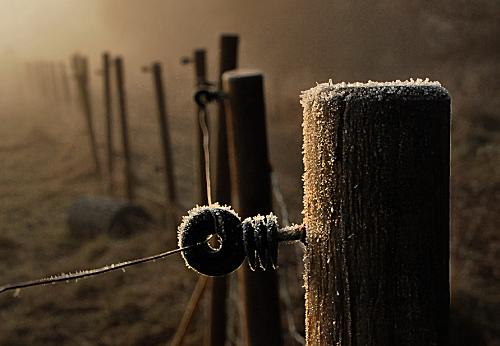
Ivar Smith-Nilsen
_______________________
Tom Lubbock: a memoir of living with a brain tumour
(....)My death is, in a sense, imminent. I say to myself: I am dying. Something in my head is hurrying to kill me.
(....)
It is a permanent mystery how we summon up a word. Where are these connections located in the mind? How do we know how we do it and get it right? This mystery only becomes evident when our ability to summon up our words fails.
(....)
I can still voice words.
But I am now pre-computer again – no thesaurus, no email, no newspapers, no radio, not now even a pen.
But I find my brain is still busy, moving, thinking. I am surprised.
My language to describe things in the world is very small, limited.
My thoughts when I look at the world are vast, limitless and normal, same as they ever were.
My experience of the world is not made less by lack of language but is essentially unchanged.
This is curious.
"Would it be imaginable that people should never speak an audible language, but should still say things to themselves in the imagination?"
Ludwig Wittgenstein
(....)
My true exit may be accompanied by no words at all, all gone.
The final thing. The illiterate. The dumb.
Speech?
Quiet but still something?
Noises?
Nothing?
My body. My tree.
After that it becomes simply the world.
...(more)
_______________________
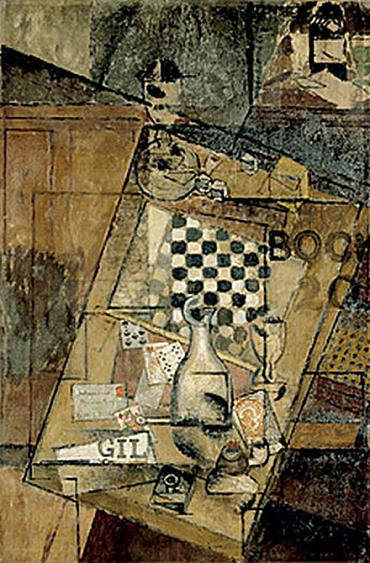
Louis Marcoussis
ca.1883-1941
_______________________
I Could Have Joined the Tea Party
Justin E. H. Smith
(....)
I think, in fact, that American whiteness is one symptom --if a milder one than ethnic cleansing and genocide-- of the process that Michael Mann has identified as 'the dark side of democracy', where cultures within modern nation-states are forcibly homogenized, and informed by central planning that their identity is now simply the identity of a citizen of that state. The US has conducted itself in this regard very much like Turkey with its Kurdish minority, whose very existence the modern secular republic has practically denied. The one difference however is that it has been assumed in the United States that this homogenizing force can extend only up to the boundaries of 'race', and that whoever lies beyond those boundaries must remain eternally other (even if 'blacks' are deemed American, this is always a special variety of American, a marked category). The parameters of the social world in the American attempt at egalitarianism are set by some supposedly inflexible biological reality about human subtypes. In this respect the US has been, for better or worse, less audacious than Turkey in the democratic project of constructing citizens.
One problem with this sort of racially defined assimilationism is, obviously, that it groundlessly biologizes and essentializes the boundaries of social identity, and so guarantees that American society can never attain to real equality to the extent that the pseudoscientific myth of race continues to have a foothold. But another problem is that it constrains 'white' people to cognize their own social world in terms of a category that is not in fact rich enough to permit them to make sense of their own experiences.(....) My take on the Tea Party movement is this: Tea Partiers are Americans who have been made to believe that they are 'white'; have been made to believe, furthermore, that this status carries with it some natural privilege; and who therefore wonder why, in spite of the fact that they are white, they have nonetheless been given the shaft....(more)
_______________________
 Agustķn Casasola
Newspaper vendors
"See the headline in El Demócrata: “El canto de la ciudad alegre” –
“The song of the happy city”, ca. 1925"
Studiolum
Poemas Del Rio Wang
Since the moment when for the first time a camera fell into his hands (it seems this was in 1902) he did not cease to hunt for images and to reveal the flow of history. In his own words, he became “a slave of the moment”.
_______________________
At the Threshold of the Book
Edmond Jabčs
Translated by Rosmarie Waldrop
Mark the first page of the book with a red marker. For,
in the beginning, the wound is invisible.
- Reb Alcé
"What is going on behind this door?"
"A book is shedding its leaves."
"What is the story of the book?"
"Becoming aware of a scream."
"I saw rabbis go in."
"They are privileged readers. They come in small groups to give us their comments."
"Have they read the book?"
"They are reading it."
"Did they happen by for the fun of it?"
"They foresaw the book. They are prepared to encounter it."
...(more)
_______________________
Judith Butler interview
Guernica
Judith Butler: I am not at all sure that I define life, since I think that life tends to exceed the definitions of it we may offer. It always seems to have that characteristic, so the approach to life cannot be altogether successful if we start with definitions. All I really have to say about life is that for it to be regarded as valuable, it has to first be regarded as grievable. A life that is in some sense socially dead or already “lost” cannot be grieved when it is actually destroyed. And I think we can see that entire populations are regarded as negligible life by warring powers, and so when they are destroyed, there is no great sense that a heinous act and egregious loss have taken place. My question is: how do we understand this nefarious distinction that gets set up between grievable and ungrievable lives? (....)
Judith Butler: Along with many other people, I am trying to contest the notion that we can only value, shelter, and grieve those lives that share a common language or cultural sameness with ourselves. The point is not so much to extend our capacity for compassion, but to understand that ethical relations have to cross both cultural and geographical distance. Given that there is global interdependency in relation to the environment, food supply and distribution, and war, do we not need to understand the bonds that we have to those we do not know or have never chosen? This takes us beyond communitarianism and nationalism alike. Or so I hope.(....)
Guernica: Last year, for one, the Mellon Foundation awarded you $1.5 million which you are using to found a critical theory center devoted to scholarship about war. How is it progressing? What are your goals?
Judith Butler: I am trying to bring together people to think about new forms of war and war waging, the place of media in the waging of war, and ways of thinking about violence that can take account of new forms of conflict that do not comply with conventional definitions of war. This will involve considering traditional definitions of war in political science and international law, but also new forms of conflict, theories of violence, and humanistic inquiries into why people wage war as they do. I’m also interested in linking this with studies of ecology, toxic soil, and damaged life.
Guernica: Do you mean to say that the concept of war might be recovered, as William James proposes, for instance, in “The Moral Equivalent of War”? Is war’s ferocity of commitment possible without the bloodlust and the bloody victims?
Judith Butler: Perhaps the issue is to become less ferocious in our commitments, to question certain forms of blind enthusiasm, and to find forms of steadfastness that include reflective thought. Nonviolence is not so much about the suppression of feeling, but its transformation into forceful intelligence....(more)
via Jim Johnson
_______________________

Roksana Mical
_______________________
After Dark
Brad Zellar
Your Man For Fun In Rapidan
There once was a dead man with a dog. The dead man, the dog, and the dead man's ghost all lived together in a cluttered apartment.
The dog seemed to have equal affection for both the dead man and the dead man's ghost, but the dead man and his ghost bickered constantly. They couldn't agree on anything. They argued about whose apartment they occupied, and contested the ownership of every single possession in the apartment. They disagreed over whose turn it was to exercise the dog, what music to listen to, and whether or not to watch television. The dead man would accuse the ghost of hiding a Lester Young CD or a book by Fernando Pessoa. The ghost would make petulant inquiries regarding a missing pair of sunglasses, and the dead man would wonder aloud whether it should be "pair of missing sunglasses," or even just "missing sunglasses," since a "pair of sunglasses," missing or not, seemed like a ridiculous expression....(more)
_______________________
Translations from the poetry of Giuseppe Ungaretti
by David W. Grunner
Monotony
Stopped before two stones
I languish
under this
fogged arc
of sky
The tangle of paths
possesses my blindness
Nothing is bleaker
than this monotony
Once
I did not know
that even
the evening consumption
of the sky
is a common
thing
And on my African soil
calmed
to an arpeggio
lost in the air
I was renewing myself
Hyperion
_______________________
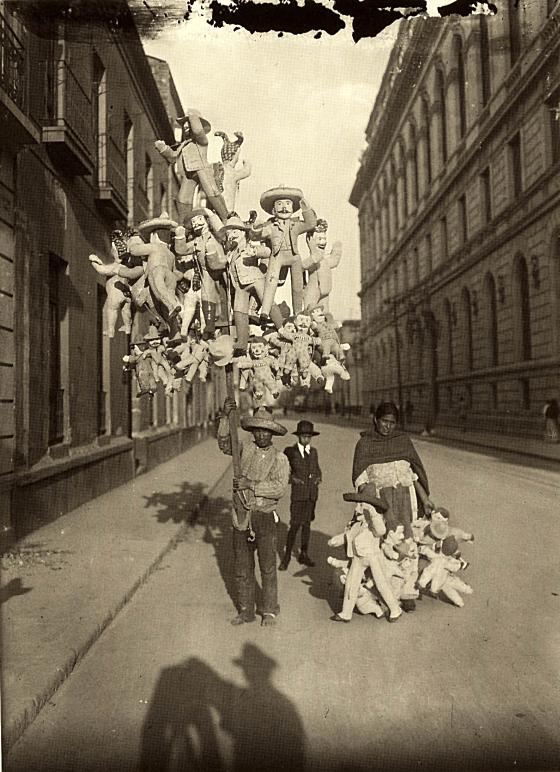
Agustķn Casasola
Studiolum
Poemas Del Rio Wang
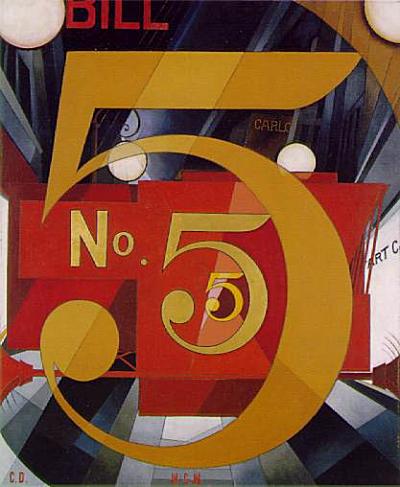
Charles Demuth
1928
Among the rain
and lights
I saw the figure 5
in gold
on a red
firetruck
moving
tense
unheeded
to gong clangs
siren howls
and wheels rumbling
through the dark city.
- William Carlos Williams
_______________________
Cognitarian Subjectivation
Franco Berardi
e-flux
The colonization of time has been a fundamental issue in the modern history of capitalist development: the anthropological mutation that capitalism produced in the human mind and in daily life has, above all, transformed the perception of time. But we are now leaping into the unknown—digital technologies have enabled absolute acceleration, and the short-circuiting of attention time. As info-workers are exposed to a growing mass of stimuli that cannot be dealt with according to the intensive modalities of pleasure and knowledge, acceleration leads to an impoverishment of experience. More information, less meaning. More information, less pleasure.
Sensibility is activated in time. Sensuality is slow. Deep, intense elaboration becomes impossible when the stimulus is too fast. A process of desensitization is underway at the point where electronic cyberspace intersects with organic cybertime. The prospect of individual subjectivation, and of social subjectivation, has to be reframed in this context, and a series of radical question arise: Is it still possible to envisage a process of collective subjectivation and social solidarity? Is it still possible to imagine a “movement” in the sense of a collective process of intellectual and political transformation of reality? Is it still possible to forge social autonomy from capitalist dominance in the psycho-economic framework of semiocapitalism?...(more)
e-flux 20via via I cite
_______________________
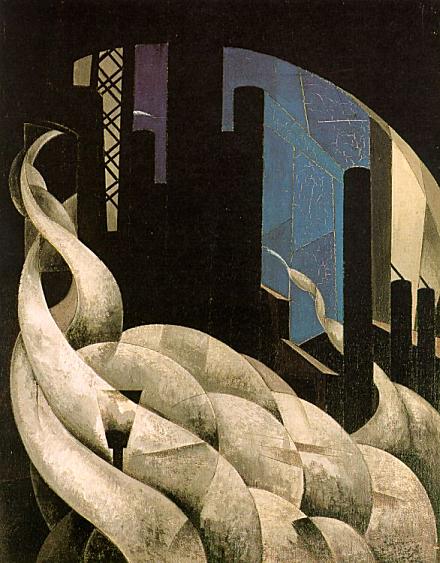
Incense of a New Church
Charles Demuth
_______________________
Six poems to mark the end of daylight saving time.
_______________________
Contractions of Time: On Social Practice from a Temporal Perspective
Nato Thompson
e-flux
In his incisive book Capitalist Realism, Mark Fisher diagnoses various psychological ailments (Attention Deficit Disorder, dyslexia, bipolar disorder) that have emerged from a social environment of deeply privatized and consumable moments:
If, then, something like attention deficit hyperactivity disorder is a pathology, it is a pathology of late capitalism—a consequence of being wired into the entertainment-control circuits of hypermediated consumer culture.
This affective control not only perpetuates a form of consumption but, more basically, a particular temporality. If products demand to be produced and consumed in ever-expanding contexts, they may also be adapted to durations more suitable to electronics than to what our bodies can endure. And without a doubt, the accelerated pace of disembodied consumer desire ultimately alters the basic structure of our bodies. “The consequence of being hooked into the entertainment matrix is a twitchy, agitated interpassivity, an inability to concentrate or focus.” We are plugged in. We are in the matrix. We are atrophied hunger machines.
Fisher’s lament that life is getting too fast and that people cannot concentrate is hardly new. And in left-leaning art culture, pointing the finger at capitalism is no more novel a diagnosis. Certainly, the dominant social order is responsible for the present social order—the system perpetuates itself and we are its subjects. And the self-help industry would be much more compelling if its balm for depression and spazzed-out children included a radical redistribution of wealth, but that goes without saying. Nonetheless, the picture Fisher paints offers a clue to an evolving condition of behavior that must be accounted for in the production of meaning in culture writ large. Any cultural formation that comes into being now necessarily does so according to the terms of a general cultural shift toward the twitchy, the disinterested, the agitated, the dyslexic, and the bipolar. ...(more)

tea party
Canadian style
October 10, 1892
James Ballantyne
Library and Archives Canada
Flickr
_______________________
Poetry’s 49th Parallel: Canadian/American Shibboleths
Camille Martin
Rogue Embryo
(....)The anthology of Canadian poetry is a recurring staple in the poetry publishing world and a vexed one because of issues of inclusion and exclusion (a nature of the anthology beast) as these issues collide with issues of ethnicity and political borders.(....)
I’ve yet to see the hybrid American-Canadian anthology. Have I truly crossed the border poetically when I’m included in a Canadian anthology? I was recently featured in a Canadian online magazine, ditch, as a Canadian poet. There I was, in the inner circle along with the true-blooded Canadians, born under the loving gaze of Queen Elizabeth. Never having switched countries before, this was a new experience. I felt as though my mask of Canadian-ness might slip off at any moment and I would be revealed as a poser.
So am I a Canadian poet?...(more)
_______________________

"A Girl From Canada"
1907
Library and Archives Canada
Flickr
_______________________
I’m Brodeck and I had nothing to do with it.
I insist on that. I want everyone to know.
I had no part in it, and once I learned what had happened, I would have preferred never to mention it again,
I would have liked to bind my memory fast and keep it that way, as subdued and still as a weasel in an iron trap.
But the others forced me. “You know how to write,” they said. “You’ve been to the University.” I replied
that my studies hadn’t amounted to much—I hadn’t even ?nished my courses and didn’t remember much about
them. They didn’t want to hear it. “You know how to write, you know about words and how to use them, you
know how they can say things. That’s what we need. We can’t do it ourselves. We’d get into a muddle, but you,
you’ll say it right, and people will believe you. Besides, you’ve got the typewriter.”
It’s very old, the typewriter. Several of its keys are broken, and I have nothing to repair it with. It’s
capricious. It’s worn out. Sometimes, for no apparent reason, it jams, as though suddenly balking. But I said
nothing about any of that, because I had no desire to end up like the Anderer.
Brodeck
Philippe Claudel
translated by John Cullen
Haunting the Present
7th Annual Festival of European Literature
In this year’s New Literature from Europe, eight cultural institutes have teamed up to present a series of discussions and readings featuring eight critically acclaimed European writers: Philippe Claudel (France), Kirmen Uribe (Spain), Jenny Erpenbeck (Germany), Gerhard Roth (Austria), Radka Denemarkovį (Czech Republic), Olga Tokarczuk (Poland), Gabriela Adames,teanu (Romania), and Antonia Arslan (Italy). Moderators will include distinguished writer André Aciman, chair of Comparative Literature and director of the Writers' Institute at the CUNY Graduate Center and Susan Bernofsky, Guest Professor of Creative Writing and Literary Translation at Queens College (CUNY).
Date: Tues. Nov. 16th
Time: 7 pm
Place: McNally-Jackson Books
52 Prince St. at Lafayette
New York, NY 10017
t: 212-274-1160
_______________________
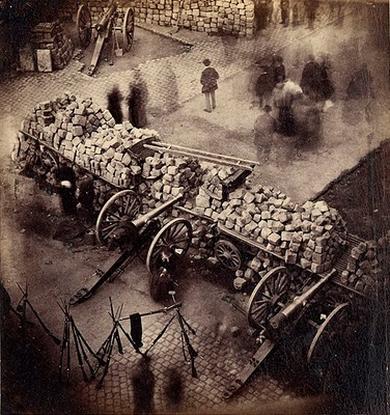
Barricades of the Commune
April 1871
Pierre-Ambrose Richebourg
1810-1893
via Idiotic Hat_______________________
Outrage, Misguided
Noam Chomsky
People rightly want answers, and they are not getting them except from voices that tell tales that have some internal coherence—if you suspend disbelief and enter into their world of irrationality and deceit.
Ridiculing Tea Party shenanigans is a serious error, however. It is far more appropriate to understand what lies behind the movement’s popular appeal, and to ask ourselves why justly angry people are being mobilized by the extreme right and not by the kind of constructive activism that rose during the Depression, like the CIO (Congress of Industrial Organizations).
Now Tea Party sympathizers are hearing that every institution—government, corporations and the professions—is rotten, and that nothing works.(....)
I am just old enough to remember those chilling and ominous days of Germany’s descent from decency to Nazi barbarism, to borrow the words of Fritz Stern, the distinguished scholar of German history. In a 2005 article, Stern indicates that he has the future of the United States in mind when he reviews “a historic process in which resentment against a disenchanted secular world found deliverance in the ecstatic escape of unreason.”
The world is too complex for history to repeat, but there are nevertheless lessons to keep in mind as we register the consequences of another election cycle. No shortage of tasks waits for those who seek to present an alternative to misguided rage and indignation, helping to organize the countless disaffected and to lead the way to a better future....(more)
_______________________
The Aryan Jesus:
Christian Theologians and the Bible in Nazi Germany
Susannah Heschel
Princeton University Press
google books
_______________________
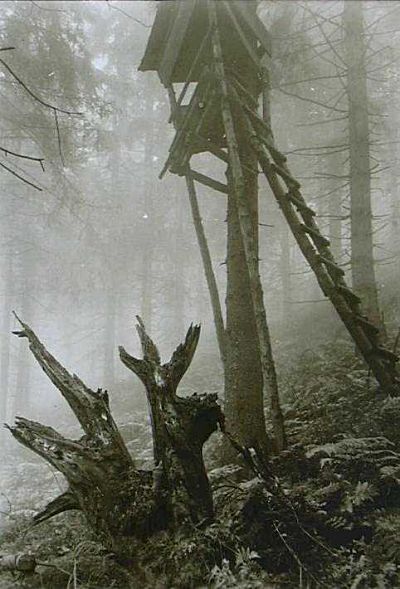
Petr Helbich
_______________________
Racism: A Passion from Above
Jacques Rancičre
Translation by Jonathon Collerson
... a lot of energy has been spent against a certain figure of racism -- embodied in the Front National -- and a certain idea that this racism is the expression of "white trash" ("petits blancs") and represents the backward layers of society. A substantial part of that energy has been recuperated to build the legitimacy of a new form of racism: state racism and "Leftist" intellectual racism. It is perhaps time to reorient our thinking and struggle against a theory and practice of stigmatization, precarization, and exclusion which today constitutes a racism from above: a logic of the state and a passion of the intelligentsia. ...(more)
MRZine
_______________________
Masculinities and Child Soldiers in Post-Conflict Societies
Fionnuala D. Ni Aolain
Abstract:
Masculinities discourses and theory have begun to transform scholarly and practical understandings of the methods and means of warfare, as well as on teasing out the causalities of war and the means to bring about an end to public communal violence between male combatants. In the context of post-conflict, peacemaking and transitional discourses, however, attention to masculinities has been much less evident. Our contribution seeks to remedy that gap by bringing the theory and practice of masculinities discourses to bear on these fields. The chapter will rebut the general presumptions that masculinities disappear at the formal ending of hostilities and during the peacemaking phase of conflict. Rather, masculinities are ever present and deeply problematic to ensuring successful outcomes with a sustainable peace. In particular, we suggest that hypermasculinity maintains its presence in post-conflict societies -- and is particularly manifest in the experiences of violence in the private sphere for women and the increases in criminality and 'ordinary' violence in transitional societies. The specific site of our exploration will be male and female child soldiers. Such groups present particular challenges to post conflict reconciliation, and occupy a unique space of both victim and perpetrator. We argue that DDR (disarmament, demobilization, and reintegration) and accountability processes have generally failed to account for the emergence of masculinities in violent childhoods, and the 'making of the man' in these contexts has long terms effects for the stability and peacefulness of a conflicted society. The intergenerational transmission of problematic masculinity norms, ought to be more clearly placed in the discourses of transition and peacemaking. The chapter focuses on developing positive gender roles for young men and women who have been egregiously violent, and who have equally been deeply violated. Social Science Research Network (SSRN)
_______________________
Deleuze on Whitehead & Leibniz
Nomadics
"A couple days ago, Charles Stivale drew my attention to a lecture by Gilles Deleuze (part of his Leibniz series) which he had just translated, a lecture from 10/3/1987 given at Vincennes – St Denis. So here, with Charles Olson and his poetics of process on my mind, is Deleuze praising Whitehead & pulling down Wittgenstein — in three installments:
- Pierre Joris
(....)That is what I have tried to show from the start, namely it’s Leibniz, and there is no worse misunderstanding… I say that the result of our earlier research is that there is no worse error about Leibniz than to understand the inclusion of the predicate in the subject as if the predicate were an attribute. And far from the predicate being an attribute, Leibniz continually denies that the predicate is an attribute; for him, the predicate is a relation, or as he says it precisely in the Metaphysical Discourse: Event, predicate or event, “or”, it cannot be stated better, as he said it in the Metaphysical Discourse. So it seems to me particularly stupid to wonder how Leibniz can take into account once he has placed the predicate in the subject. Not only does he take relations into account, he has no difficulty taking relations into account for the simple reason that, for him, what he calls predicate is the relation, it’s the event. We already began to see a bit how he took account of the relation, but we are leaving that aside. We can well expect that this causes him no problems, a theory of relations. It is only a problem from the perspective of a false Leibniz for whom the reader would believe that the predicate, for Leibniz, is an attribute. In that case, one could ask, in fact, how can a relation be included in the subject. But if what is included in the subject are events, and by definition, as he says it very well, events are relations with existence. And there, we have to take seriously the word relation. Everything is event, at least all predicates are events. And there, for the third time, the cry reverberates with Whitehead: Everything is event....(more)
Part 2
_______________________

Petr Helbich
_______________________
The Church says:
the body is a sin
Science says:
the body is a machine
Advertising says:
the body is a business
The body says:
I am a fiesta.
-
Eduardo Galeano
Informant38
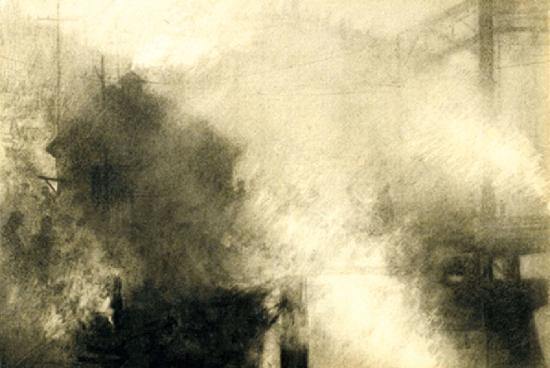
morning mist at the mine mouth,
Monongah, West Virginia, 1908.
Joseph Stella
d. Nov. 5, 1946
_______________________
the war on resentment must be won
Infinite ThŲught
(....)
There is a war going on, for sure, everywhere and at all times, from the macro-level to the tiniest of micro-interactions. This resentment, the resentment encouraged everywhere and at all times against those who are trying to salvage beneficial things from the demented onslaught of British political idiocy; the resentment against those who protest; the resentment, above all, against those who do not themselves resent. For this is the unforgivable thing: surely we must resent those who do not work, or those who do, but weren’t born here? Surely we must care, above all, about minimising our tax bills, about selfishly protecting those we love at all costs…the work done on people to get them to hate others, to feel personally aggrieved when others appear to be stealing their enjoyment, is a relentless operation. It must be possible to make visible the faulty supports of this resentment, somehow. It takes a great deal of work to get someone to stop caring about other people, to hate strangers; we need a similar propulsive force to reverse this much leech-like of affects. The theoretical and convincing de-personalisation of the structures of everyday life in the name of a re-personalisation of politics. ...(more)
_______________________
The multitudes have answers to questions which have not yet been asked, and the capacity to outlive the walls. Trace tonight her (his) hairline with your two fingers before you sleep.
That have not been asked: ten dispatches about endurance in face of walls with quotations from Andrei Platonov (1899-1951)
John Berger, 16 February 2005
From time to time despair enters into the lives which are mostly grief. Despair is the emotion which follows a sense of betrayal. A hope against hope (which is still far from a promise) collapses or is collapsed; despair fills the space in the soul which was occupied by that hope. Despair has nothing to do with nihilism.
Nihilism, in its contemporary sense, is the refusal to believe in any scale of priorities beyond the pursuit of profit, considered as the end-all of social activity, so that, precisely: everything has its price. Nihilism is resignation before the contention that Price is all. It is the most current form of human cowardice. But not one to which the poor often succumb.
(....)
The worst cruelties of life are its killing injustices. Almost all promises are broken. The poor’s acceptance of adversity is neither passive nor resigned. It’s an acceptance which peers behind the adversity and discovers there something nameless. Not a promise, for (almost) all promises are broken; rather something like a bracket, a parenthesis in the otherwise remorseless flow of history. And the sum total of these parentheses is eternity.
This can be put the other way round: on this earth there is no happiness without a longing for justice.
Happiness is not something to be pursued, it is something met, an encounter. Most encounters, however, have a sequel; this is their promise. The encounter with happiness has no sequel. All is there instantly. Happiness is what pierces grief.
We thought there was nothing left in the world, that everything had disappeared long ago. And if we were the only ones left, what was the point of living?
“We went to check”, said Allah. “‘Were there any other people anywhere? We wanted to know.”
Chagataev understood them and asked if this meant they were now convinced about life and wouldn’t be dying any more.
“Dying’s no use”, said Cherkezov. “To die once – now you might think that’s something necessary and useful. But dying once doesn’t help you to understand your own happiness – and no one gets the chance to die twice. So dying gets you nowhere.”
...(more)

John Berger
(b. November 5. 1926)
photo Jean Mohr
Describe the truth until it sticks
John Berger
Appearances like words can also be read and, amongst appearances, the human face constitutes one of the longest texts.
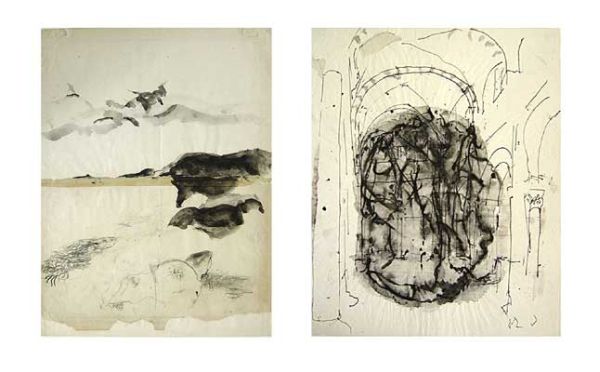
John Berger and Marisa Camino
Ways of Seeing
John Berger
UbuWeb Film
_______________________
Excerpt from No Shelter
Pura López-Colomé
translated by Forrest Gander
graywolf press
I Follow You
To see oneself without the world,
not to recognize oneself in the mirror.
How fragile
we are, and frail,
made only of meat and bone.
The finest feelings come clear
in the tangible memory of someone
whose appearance is already intangible.
As children,
we swallow the void,
what is yours without you,
me.
Wanting a voice to fill us,
we strain to hear echoes within
which never stop
dreaming of their origins.
Happy is she who can face
all that withdraws
and remains.
No Shelter: Selected Poems of Pura López-Colomé
translated by Forrest Gander
Graywolf Press
Questions, Occasions, Questions: An Interview with Pura López-Colomé and Forrest Gander by Jen Hofer MAKE Issue 7
_______________________
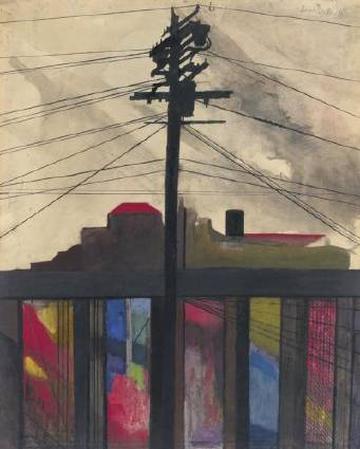
Joseph Stella
_______________________
Textual Communities: Nancy, Blanchot, Derrida.
Kuisma Korhonen
culture machine
(....)
Is there still any form of community that would not lead us to the kind of 'identity rage' that created the Holocaust and the Gulag? That would still count as a 'community' and resist the war of everyone against everyone that governs the logic of neo-capitalism? Can we form a community, for example a community of readers, which would not identify itself as antagonistic to other communities?
These are some of the questions that have given rise to the contemporary debate on the notion of community. Although the roots of this debate are deeply embedded in the Western philosophical tradition, we can discern the starting point for a more recent discussion in Jean-Luc Nancy's essay 'La communauté desoeuvré' (1983), in which the French philosopher borrowed the central notion of désouvrement from Maurice Blanchot while reading the work of Georges Bataille. Blanchot soon replied to Nancy in a small book called La communauté inavouable (1983), which included two essays, 'La communauté negative', on Nancy's close reading of Bataille and 'La communauté des amants', on a récit by Marguerite Duras. The foundational figure in this dialogue was, in a way, Bataille, but we know that Bataille was already deeply influenced by Blanchot; and even though Blanchot seemed to be just commenting upon Nancy's text, we also know that Nancy's text had been already heavily influenced by Blanchot. Nancy then continued the dialogue in two books: La communauté desoeuvré (1986) and La communauté affrontée (2001). This dialogue is thus already a work of a textual community ' a virtual, heterogeneous, changing, and temporary community that also includes thinkers such as Emmanuel Levinas, Jacques Derrida, Giorgio Agamben and Alphonso Lingis.
In the background of this discussion has been the conviction, shared more or less by all the authors mentioned above but expressed perhaps most memorably by Levinas, that human subjects come into being only in relation to the Other. Singularities may gain their subjectivity only by facing the other or the multiplicity of others; before one can construct any immanent self-hood, one has already been called into question by the existence of others.
Some primal community is thus inescapable, but it is soon replaced by communities that constitute themselves as work ' communities that exist in order to produce an identifiable institution that then defines the identity of its members, or communities that are produced by the work of those institutions. These communities ' the whole network of social relationships and institutions in our modern society ' are based upon a conviction that everything can be brought under human control, and that the active subject can construct everything, even the foundations of her own subjectivity, with a free and independent will (Blanchot, 1983: 11). This conviction found its extreme form in Nazism and Stalinism, where it became the myth of a new, promised society ' a mythical community that Nancy describes in his La communauté désoeuvree. However, also avant-gardist communities that in principle resist all totalitarian ideologies ' like, for example, the group of surrealists, led by the 'pope' André Breton ' are subject to myth formation, communal identities that replace singularities, and dreams of action that reveal an illusion of an immanent will. Even though their anti-totalitarian and anti-instrumental ideology also leads them to resist all strong communities and cause immediately internal disputes and unavoidable ruptures, they still form their own mythology and their own institutions and ways in which the community becomes 'a work', a teleological organization that reduces the original being-together to certain goals and objectives....(more)
Culture Machine 8 (2006) - Community
_______________________
As the World Burns:
50 Simple Things You Can Do to Stay in Denial
(A Graphic Novel)
Derrick Jensen and Stephanie McMillan (Illustrator)
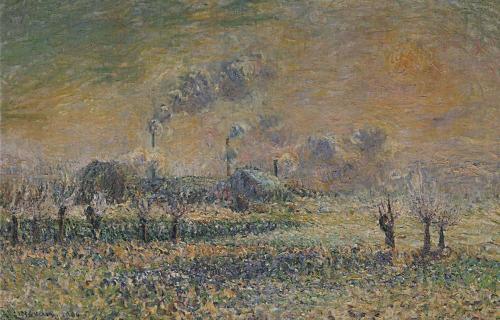
Hoarfrost near Pontoise
Gustave Loiseau
1865-1935
_______________________
Dream and Derangement
Georg Trakl
d. Nov. 3, 1914
In the evening the father became an old man; in dark rooms the countenance of the mother petrified and the curse of the degenerated race weighed on the boy. Sometimes he remembered his childhood, fulfilled with sickness, terror and eclipse, secret games in the star-garden, or feeding the rats in the dusking courtyard. From the blue mirror the narrow figure of the sister stepped and he fell as if dead into darkness. At night his mouth burst open like a red fruit and stars gleamed over his speechless grief. His dreams fulfilled the ancient house of the fathers.(....)
Deep is the slumber in dark poisons, fulfilled with stars and the white countenance of the mother, the stony one. Bitter is death, the fare of the guilt-laden; in the brown branches of the family tree the earthen faces decayed grinning. But quietly the other one sang in the green shadow of the elderberry, when he woke from evil dreams; sweet playmate, a rosy angel, approached him, so that he, a soft deer, slumbered into the night; and he saw the star-countenance of purity. The sunflowers sank golden over the garden fence when the summer came. O, the diligence of bees and the green leaves of the walnut tree; the thunderstorms passing by. Silverly the poppy bloomed also, bore in green bud our nocturnal star-dreams. O, how silent the house was when the father passed away into darkness. The fruit ripened purple on the tree and the gardener moved his hard hands; o the hairy signs in the radiant sun. But silently in the evening the shadow of the dead man entered the grieving family circle and his step sounded crystalline over the green meadow before the forest. Muted ones, those gathered around the table; dying ones with waxen hands they broke the bread, the bleeding. Woe of the sister's stony eyes, when at the meal her insanity appeared on the brother's forehead, when under the mother's suffering hands the bread turned to stone. O, of the putrefied ones, when with silver tongues they silenced hell. Thus the lamps in the cool room died out and through purple masks the suffering humans looked at each other silently. The night long rain poured down, and recreated the meadow. In thorny wilderness the dark one followed the yellowed paths in the corn, the song of the lark and the soft stillness of green branches, so that he might find peace. O, you villages and mossy stages, glowing sight. But bonily the steps stagger over sleeping snakes at the forest edge and the ear always follows the raving scream of the vulture. In the evening he found a stony solitude, a dead man's escort into the dark house of the father. Purple cloud covered his head, so that he silently attacked his own blood and effigy, a moony countenance; stony sank away into emptiness, when in a broken mirror a dying youth, the sister appeared; the night engulfed the cursed race....(more)
Wersch's Trakl-Site
Index of all literary texts of Georg Trakltranslations by Jim Doss and Werner Schmitt
Twenty Poems of Georg Trakl [pdf]
Translated and Chosen James Wright and Robert Bly _______________________
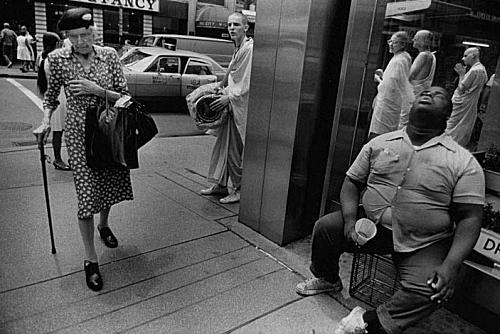
blind man, old woman, hari krishnas
NYC, 1972
Paul McDonough
Sasha Wolf Gallery
New York Photographs 1968-1978
Paul McDonough
_______________________
It's really too late for both parties. They're unreformable. They've squandered their legitimacy just as the US enters the fat heart of the long emergency. Neither of them have a plan, or even a single idea that isn't a dodge or a grift. Both parties tout a "recovery" that is just a cover story for accounting chicanery and statistical lies aimed at concealing the criminally-engineered national bankruptcy that they presided over in split shifts. Both parties are overwhelmingly made up of bagmen for the companies that looted America.
-
James Howard Kunstler
_______________________
When you have spent two generations and billions of dollars building a Base of reprogrammable bigots, imbeciles and Christopaths, the full, focused power of pure, relentless, omnidirectional, bald-faced lying is truly breathtaking.
driftglass
- driftglass
_______________________
A Sentence About Tyranny
Gyula Illyés
Nov. 2, 1902 – April 15, 1983
Translated by George Szirtes
Hungarian Quarterly
(....)
tyranny supplies
the standing ovation, the loud
hurrahs and chanting of the crowd
at the conference, the songs
of tyranny, the breasts
that tyranny infests,
the loud unflagging
noise of rhythmic clapping,
at the opera, in trumpet cry,
in the uproarious lie
of grandiose statues, of colours,
in galleries,
in the frame and the wash,
in the very brush,
not just in the neat snarl
of the midnight car
as it waits
outside the gates
tyranny permeates
all manners and all states,
its omnipresent eyes more steady
than those of old Nobodaddy,
there's tyranny
in the nursery
in father's advice, in his guile,
in your mother's smile
in the child's answer
to the perfect stranger;
not just in wires with barbs and hooks
not just in rows of books,
but, worse than a barbed wire fence
the slogans devoid of sense
whose tyranny supplies
the long goodbyes;
...(more)
_______________________
Sheep Language
Hilda Morley
1916 - 1998
What have I done that I should find myself
here, in this meadow
in the Cotswolds, sheep bleating
(from time to time) on the other side of
the fence,
hurrying away
from the drinking-trough as I pass,
so I feel
their peace infringed upon
(& I the cause of it)
that peace their drowsy presence overfills to brimming,
Keatslike, almost more than I can hold
But I hold it
as if in a waking dream, the spell is
upon me & out of it
my voice can speak & speaks as
it must in accents only they
can understand:
a voice for them,
speaking
as they need to hear it,
have heard it
centuries ago—sheep-language—
I must have
stood here & found the sequence
of words, the phrase,
the cadence
formed for their ears,
for the rhythm
of their nuzzling,
their nudging movements
& I, a speaker
of first-generation English,
who recognize the knights
in stained-glass windows
in the village churches
of Gloucestershire which William Morris loved,
those knights
who cut my Jewish forefathers down, setting out
for the Crusades,
these little churches built, as
Morris saw them
in joyful dedication,
out of love.
_______________________
Another Naming, a Living Animal: Blanchot's Community
Andrew Benjamin
SubStance #117
mediafire pdf link
 The dog appears. Its head is above the line. Is the dog slipping back? Its head is on the line. Is it submerging again, tasting death as the admixture of fear and the quicksand that will eventually end the ebb and flow of life? Is it scrambling futilely up a bank that no longer holds? The dog is being defined by its eventual death. While still allowing for the severity of the animal’s predicament, its appearance may be precisely the ebb and flow, thus a continuity of life not structured by death but by having-to-exist. Within what then does the dog appear? The question has force precisely because it has an exigency that cannot be escaped since neither answer nor direct resolution is at hand. The question endures. Once allowed, the question repositions the line. No longer mere appearance, the line is neither the sign of a simple division nor is it able to sustain a simple either/or. Death cannot be equated with the dark. Equally, the light cannot be reduced to the life that may be escaping. (Though it should not be forgotten that Goya’s work belongs to the so-called Black Paintings.) The dog’s head interrupts the line. As a result, what is opened is a site. Perhaps, to use a word that will play an important role in the analysis to come, what emerges is an écart that refuses simple and symmetrical oppositions.(....) The dog appears. Its head is above the line. Is the dog slipping back? Its head is on the line. Is it submerging again, tasting death as the admixture of fear and the quicksand that will eventually end the ebb and flow of life? Is it scrambling futilely up a bank that no longer holds? The dog is being defined by its eventual death. While still allowing for the severity of the animal’s predicament, its appearance may be precisely the ebb and flow, thus a continuity of life not structured by death but by having-to-exist. Within what then does the dog appear? The question has force precisely because it has an exigency that cannot be escaped since neither answer nor direct resolution is at hand. The question endures. Once allowed, the question repositions the line. No longer mere appearance, the line is neither the sign of a simple division nor is it able to sustain a simple either/or. Death cannot be equated with the dark. Equally, the light cannot be reduced to the life that may be escaping. (Though it should not be forgotten that Goya’s work belongs to the so-called Black Paintings.) The dog’s head interrupts the line. As a result, what is opened is a site. Perhaps, to use a word that will play an important role in the analysis to come, what emerges is an écart that refuses simple and symmetrical oppositions.(....)
Writing, bound up with the move to literary language, involves a conception of work that resists the automatic directionality inherent in the logic of negation and equally in the predication of an already determined sense of measure. And yet, measure and production are occurring. At work here—a work signalled by the co-presence of “working” (travaillant) and “unworking” (désoeuvrant)—is a specific economy. The “Unique” as the destruction of nature reinforces the need to understand that determination as predicated on that economy, and therefore as involving a form of production. Prior to addressing this economy, the question that has to be taken up concerns the relationship that the mode of human being identified in Blanchot’s writings on Sade may have to the between and with it to the us.
If the question arising from the interconnection of between and the us can be asked with stark simplicity, then it is the question of community....(more) [pdf]
_______________________
The Museum of Stones
Carolyn Forché
This is your museum of stones, assembled in matchbox and tin,
collected from roadside, culvert, and viaduct,
battlefield, threshing floor, basilica, abattoir,
stones loosened by tanks in the streets
of a city whose earliest map was drawn in ink on linen,
schoolyard stones in the hand of a corpse,
pebble from Apollinaire’s oui,
stone of the mind within us
carried from one silence to another,
stone of cromlech and cairn, schist and shale, hornblende,
agate, marble, millstones, and ruins of choirs and shipyards,
chalk, marl, and mudstone from temples and tombs,
stone from the silvery grass near the scaffold,
stone from the tunnel lined with bones,
lava of the city’s entombment,
chipped from lighthouse, cell wall, scriptorium,
paving stones from the hands of those who rose against the army,
stones where the bells had fallen, where the bridges were blown,
those that had flown through windows and weighted petitions,
feldspar, rose quartz, slate, blueschist, gneiss, and chert,
fragments of an abbey at dusk, sandstone toe
of a Buddha mortared at Bamiyan,
stone from the hill of three crosses and a crypt,
from a chimney where storks cried like human children,
stones newly fallen from stars, a stillness of stones, a heart,
...(more)
Carolyn Forché at the Poetry Foundation
Mechanical Angel: Carolyn Forché and the Material Projection of Messianic History
Alan Clinton
_______________________

Under the Shadow of the Garth
Kate Nolan
via
_______________________
Grodek
Georg Trakl
Translated by James Wright and Robert Bly
At evening the woods of autumn are full of the sound
Of the weapons of death, golden fields
And blue lakes, over which the darkening sun
Rolls down; night gathers in
Dying recruits, the animal cries
Of their burst mouths.
Yet a red cloud , in which a furious god,
The spilled blood itself, has its home, silently
Gathers, a moonlike coolness in the willow bottoms;
All the roads spread out into the black mold.
Under the gold branches of the night and stars
The sister’s shadow falters through the diminishing
grove,
To greet the ghosts of the heroes, bleeding heads;
And from the reeds the sound of the dark flutes of
autumn rises.
O prouder grief ! you bronze altars,
The hot flame of the spirit is fed today by a more
monstrous pain,
The unborn grandchildren.

Bocherina
Modest Cuixart
b. Nov. 2, 1925
1 2
_______________________
Two Stories
Louis Cancelmi
conjunctions
The New Stylists
They were the first, in fact, to make up stories. Others before them had told tales, of course, had lied, had imagined things, but these were the first to rely strictly on language, its symbols, its logic, its effects. You would not know this simply by reading one of their texts. Their texts were like other texts, seemed like other texts to represent certain characters, places, locations; but whereas other texts might be at least partly drawn from experience, tradition, observation, these stories were—the fact has been rigorously established—produced from nothing. The sentences, on close inspection, resemble mathematical equations; they may be written and rewritten a thousand different ways without changing the underlying sense; and yet they are not, for that, obscure or lifeless or, as one critic charged, covinous. Our language itself seems to prevent that, and their writing, it has been noted, owed everything to their language. Doesn’t all writing? you ask. Certainly, yes, but before this new approach developed, writers owed a great deal to life as well, to their own memories, to everything that was not writing. That is what changed. And though we now, from an historical perspective, may look on it as a sort of breakthrough, it should be emphasized that this evolution in literature was originally seen (as is so frequently the case with innovation) as a defect. Indeed the trailblazing writers themselves largely understood their advances to be failures, and more than one New Stylist (as they came to be known) prematurely ended his or her career and, sometimes, his or her life, in desperation—of a sort now difficult for us to comprehend—desperation born of an inability to write in the old way.
...(more)
_______________________
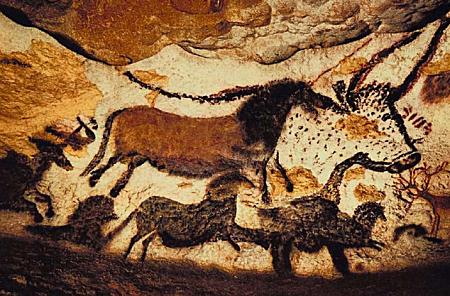
Lascaux
ca. 15,000-10,000 BC
_______________________
The Muses
Jean-Luc Nancy
translated by Peggy Kamuf
mediafire pdf
Painting in the Grotto
(....)
Man began in the calmly violent silence of a gesture: here, on the wall, the continuity of beings was interrupted by the birth of a form, and this form, detached from everything, even detaching the wall from its opaque thickness, gave one to see the strangeness of the being, substance, or animal that traced it, and the strangeness of all being in him.
At this, man trembled, and this trembling was him.
(....)
_______________________
I'm With the Hunter-Gatherers
Justin E. H. Smith
... rather than simply assuming that all varieties of industrial --or, somewhat more broadly, of blue-collar-- labor are worthy of equal valorization simply in view of the class membership of the laborer, I would much prefer a perspective on labor that takes into consideration what is being labored towards. And where the telos is indefensible, I would rather not feel obligated to defend labor simply because it is labor. After all, is it not a gross perversion of the laudable aims that brought labor unions into existence to see employees of the American prison industry gaining job security for themselves through collective bargaining? Can anyone honestly say that a victory for prison guards in a state like California --where 27 times more money is spent on juvenile detainees in the criminal justice system than on students in the public school system-- is a victory for oppressed peoples?
The industrial proletariat and other blue-collar laborers, I mean to say, have no particular grip on my sense of justice, when right alongside it --frequently as a condition of its thriving-- we find millions of disenfranchised prisoners, and billions of domesticated animals, all of whose lives consist in unmitigated suffering from beginning to end. Moving from the American to the global context, we find labor --the labor of blue-collar oil industry workers, logging-industry workers, miners, ranch-hands, and so on-- coming up against the interests of people who have never yet had so much as the opportunity to enter the working class. They've never worked at all! They are the people Marx thought were beyond the pale of history, the people who can't even be cast as extras in the grand play of class conflict. Again, here, I know which side I'm on.
There is nothing worse for members of pre-labor communities, particularly indigenous and nomadic peoples, than to be forced by dint of circumstance into a social world that recognizes only the working class and the various gradations of the upper class: management, ownership, and so on. Forced to enter a social world that recognizes only these distinctions, they of course come in at the sub-basement level, and they are despised for being so unable to get their acts together that they can't even make it as common laborers....(more)
_______________________
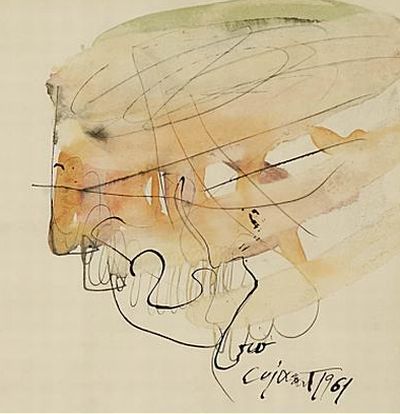 Modest Cuixart
_______________________
Walter Benjamin: Cult
Tom Clark
A religion may be discerned in capitalism -- that is to say, capitalism serves essentially to allay the same anxieties, torments and disturbances to which the so-called religions offered answers.
We cannot draw closed the net in which we are caught...
(....)
Capitalism is a purely cultic religion, perhaps the most extreme that ever existed. In capitalism, things have a meaning only in their relationship to the cult; capitalism has no specific body of dogma, no theology. It is from this point of view that utilitarianism acquires its religious overtones.
-
Capitalism as Religion (fragment): Walter Benjamin, 1921,
edited excerpt (translation by Rodney Livingstone
_______________________

Stephen Fry Kinetic Typography - Language
Matthew Rogers
vimeo
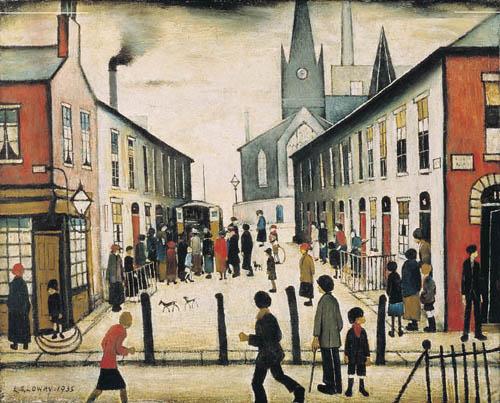
The Fever Van
1935
Lawrence Stephen Lowry
b. Nov. 1, 1889
_______________________
Changing
Akhtar Ul-Iman
Translated from UrduUrdu by M. A. R. Habib
In this teeming city, is there none
Who might recognize me, walking,
Calling: Hey, you, madman!
We two might embrace just there,
Forgetting our place, surroundings,
To swear, laugh, scuffle,
Sit in the shade of some nearby tree,
Listening, talking, for hours.
And in this market of pristine souls
This priceless life of mine
Might, for a day, change.
Words without Borders
November 2010: Tablet and Pen: Writing from the Modern Middle East
_______________________

American Lake Scene
1844
Thomas Cole
1801-1848
_______________________
Imagining the Future, but Not Predicting It
Margaret Atwood interviewed by Maria Browning
Chapter 16
a community of Tennessee writers, readers & passersby
Maria Browning blogs at BitterGrace Notes
_______________________
Otoliths 19
Editor: Mark Young
from The Philosophy of Decomposition / Re-composition as Explanation:
A Poe and Stein Mash-up
Michael Leong
Otoliths
As a literary character in a popular novel, I could nearly taste the reconciliation of poetry and prose. I was preparing to book a maiden course through a prolonged and vivid confusion, to bore clear through the lying heart of history. I was to put pen to paper while submitting to the nightly violence of a word storm:
time and again
the beauty
of all
or the beauty
of nothing
little
by little
a something
added
makes it
so much more
to perceive
the sorrow
of
the certain
inside
the air
of the
possible
here
and there
precision error
points to
books that
tell
...(more)
Michael Leong's website
_______________________
Keepers of the Image
Meditations on documenting the secret self.
Fanny Howe
To me the discovery was similar to the “message in the bottle” that Paul Celan used to describe his poetry. Her [Ilona Karmel] message gave me comfort, because it pulled me back from the icy knife of psychology; its authority was born from an experience.
The message was both casual and deeply thought, and its purpose was to explain why she had been compelled to write her masterpiece, An Estate of Memory.
My purpose writing this now is to share this thing of value from the twentieth century and in particular from the war that has haunted our world, from painting to film to poetry, as a collective nightmare. The experience of that time belonged to Ilona’s generation, though the residue of the experience has glowed in the structures of literature and philosophy and other arts, like pieces of shrapnel in a patient’s brain....(more)
_______________________
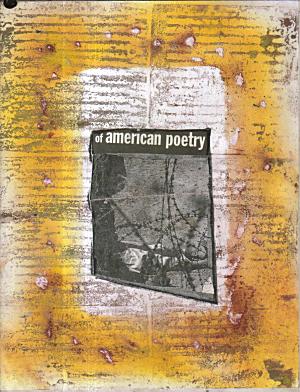
Wall Scrawls
David-Baptiste Chirot
Otoliths
_______________________
From the Translator: Kim M. Hastings on Translating “Borges’s Secretary”
words without borders
Not long after I translated “Borges’s Secretary,” I received a handwritten note thanking me for sharing the work and remarking, “it never seems to read like a translation.” What happier line for a translator to hear, especially as it came from Alberto Manguel, celebrated writer, translator, and one-time assistant to Borges (not his secretary, in the end, but something even more intimate, his reader, Borges’s access to books he could no longer read himself but had to have read to him).
(....)
What then of my task as translator? In rendering Lścia's story, crafted in Portuguese, into English, I entered a labyrinth of sorts, translating a translation about a translator. But the text, in this sense, offers infinite possibilities of interpretation, even more readings than there are readers since each time we return to a text, we approach it from a new and different perspective. My translation is one among many. Indeed, so much so that within the same week of its appearance in Words Without Borders, an Egyptian poet came along and rewrote my version. His is in Arabic, the language in which the endless, authorless Thousand and One Nights, which Borges read and reread and translated in his own way, were said to have first been put down on paper.
...(more)
Borges’s Secretary
Lścia Bettencourt
_______________________
 Perth Union Public Library
sprouting a new solar roof
seen from my backyard
photo - mw
|



 Janus Head
Janus Head

 The Age of Briggs & Stratton
The Age of Briggs & Stratton








































 The dog appears. Its head is above the line. Is the dog slipping back? Its head is on the line. Is it submerging again, tasting death as the admixture of fear and the quicksand that will eventually end the ebb and flow of life? Is it scrambling futilely up a bank that no longer holds? The dog is being defined by its eventual death. While still allowing for the severity of the animal’s predicament, its appearance may be precisely the ebb and flow, thus a continuity of life not structured by death but by having-to-exist. Within what then does the dog appear? The question has force precisely because it has an exigency that cannot be escaped since neither answer nor direct resolution is at hand. The question endures. Once allowed, the question repositions the line. No longer mere appearance, the line is neither the sign of a simple division nor is it able to sustain a simple either/or. Death cannot be equated with the dark. Equally, the light cannot be reduced to the life that may be escaping. (Though it should not be forgotten that Goya’s work belongs to the so-called Black Paintings.) The dog’s head interrupts the line. As a result, what is opened is a site. Perhaps, to use a word that will play an important role in the analysis to come, what emerges is an écart that refuses simple and symmetrical oppositions.(....)
The dog appears. Its head is above the line. Is the dog slipping back? Its head is on the line. Is it submerging again, tasting death as the admixture of fear and the quicksand that will eventually end the ebb and flow of life? Is it scrambling futilely up a bank that no longer holds? The dog is being defined by its eventual death. While still allowing for the severity of the animal’s predicament, its appearance may be precisely the ebb and flow, thus a continuity of life not structured by death but by having-to-exist. Within what then does the dog appear? The question has force precisely because it has an exigency that cannot be escaped since neither answer nor direct resolution is at hand. The question endures. Once allowed, the question repositions the line. No longer mere appearance, the line is neither the sign of a simple division nor is it able to sustain a simple either/or. Death cannot be equated with the dark. Equally, the light cannot be reduced to the life that may be escaping. (Though it should not be forgotten that Goya’s work belongs to the so-called Black Paintings.) The dog’s head interrupts the line. As a result, what is opened is a site. Perhaps, to use a word that will play an important role in the analysis to come, what emerges is an écart that refuses simple and symmetrical oppositions.(....)